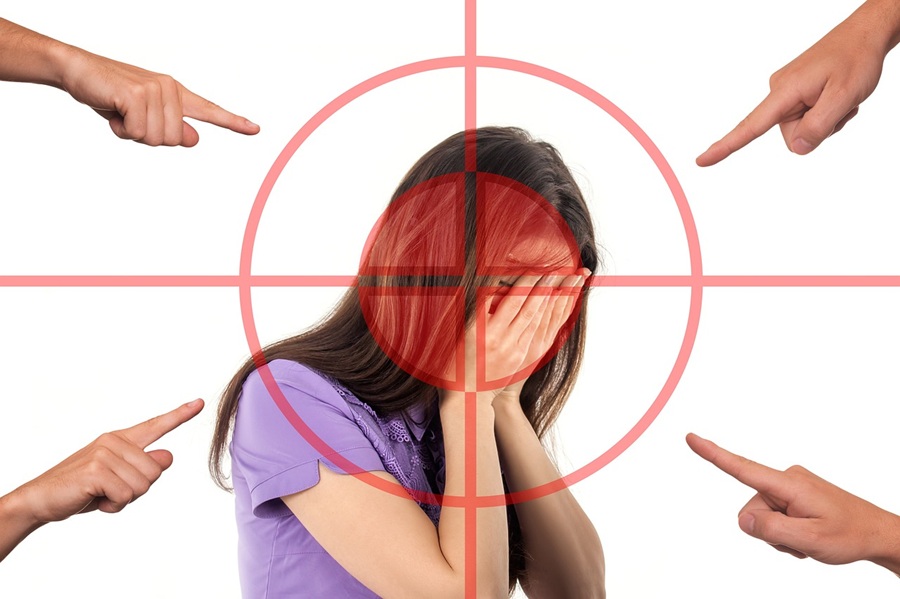- Opinion
- 7 de November de 2025
- No Comment
- 10 minutes read
School Bullying – And what about the victims?

Foto: Gerd Altmann – Pixabay

It is a familiar tale: a king convinced of the happiness and wellbeing of his subjects without ever having set foot in any of their cities. He travelled with his retinue, always accompanied by his grand vizier, who found one far-fetched reason after another to avoid entering any of them, preferring instead to camp at a prudent distance. Always, of course, with a splendid view of a marvellous urban skyline suggesting dreamlike cities that were nothing but the vizier’s trickery – cardboard façades, easily erected and dismantled. In truth, the king’s subjects scraped by in filthy, wretched towns, far from his route. We are left unsure whether the monarch lived happily in self-deception, a mere coward, or whether he simply did not care, and was therefore a cynic.
In education, we have been staging this little fable for several decades now. Society has been kept at a distance from the true reality of education, allowed to see only the distant, prefabricated skyline of an officially proclaimed new educational Arcadia, upheld by a rigid monopoly of propaganda that has long declared any form of dissent to be heresy. But even the strongest welds burst when the internal pressure exceeds their strength. And that is precisely what is happening now. The stench of decay from the box in which we have supposed poor Schrödinger’s cat to be confined is now so overpowering that it no longer makes sense to ask whether it is alive or dead; the air has become unbreathable.
It is time to open the box, to let in some air and clear out the filth. Yet this demands first acknowledging the scale of the damage caused by culpable—if not criminal—negligence. Among its many consequences stands out the loss of teachers’ authority, unjustly undermined by the very education laws themselves, which have led to the proliferation of genuine states of anomie in our schools. One of the most shameful outcomes of this has been the spread of bullying. A phenomenon that politicians and “pedagocrats” distort and prettify with a zeal that would be admirable if it were not so perverse, concealing it from a subdued society that has so far chosen to keep timidly silent.
The problem is not new, but it has worsened in recent years to the point where it can no longer be ignored: however much one looks the other way, the stench still reaches us. There is a very serious breakdown of order and discipline in our schools, and the passivity fostered by the education laws themselves has only made things worse. It has driven some pupils to suicide—in the most tragic cases—or left countless others with indelible psychological scars. All this has taken place amid a climate of impunity that the bullies have perfectly understood.
Recently, a criminologist[i] and government adviser on child protection publicly called for the age of criminal responsibility to be lowered, given the alarming increase in such abhorrent behaviour. Around the same time, a well-known teacher and forensic expert[ii] declared that “some children are psychopaths”. Both got flak from all sides after provoking the wrath of the guardians of political correctness, accused of being fascists and of demonising childhood and adolescence.
These were not fanciful ideas; on the contrary, they were reasoned arguments in response to a reality slipping from our grasp and claiming ever more victims on its sinister altar. In the first case, the growing and alarming proliferation of “crimes” that are technically not crimes because they are committed by legally unaccountable minors; in the second, following the latest, so far, suicide of a bullied girl at her school. How many more must there be before, given that the authorities fail to act, society wakes up and understands that these are not isolated incidents but systemic issues—and that these cases are merely the tip of a much larger iceberg?
But no—punishment is authoritarian, we are told. To punish is fascist, decree some half-witted souls in or around positions of power. We are also told that “the protocols failed”, or that “teachers did not know how to apply them”, or perhaps simply “refused to”. It takes remarkable audacity to mouth such iniquities—especially from those who drafted such useless, unworkable protocols in the first place, tying teachers’ hands and feet. Years ago, I participated in a television debate concerning a real case in which a teacher risked life and limb to separate two pupils who were attacking one another. The parents of one—the aggressor, of course—filed criminal charges against her for causing minor injuries: a faint mark on the boy’s arm as she intervened. The headteacher then opened disciplinary proceedings against her; after all, that was precisely what the protocol prescribed. Have we truly lost all sense?
And when the protocols and mediation processes are followed, the usual outcome is that the bullied pupil is transferred to another school while the bully remains, free to swagger about as before. That, in the best of cases. Why are there no public records of repeat offenders? Can anyone guess? What kind of society are we building?
And of course, as was proclaimed years ago, following the murder of a teacher in Barcelona by a disturbed pupil, “a teacher has died, but the child is the victim”. In other words: the dead to the grave, the living to their business—move along. Nothing to see here. This “argument” forms the basis of the well-meaning, feel-good response: to treat the aggressor as a victim too, by virtue of whatever unfair circumstances may have shaped their life experiences. Because, evidently, there are no psychopathic minors. Curiously, psychopathy can only supposedly be diagnosed after a certain age has been reached, which is perplexing. Yet many psychiatrists maintain that such children do exist. In short, the experts are out there.
Of course, as was proclaimed years ago when a disturbed pupil in Barcelona murdered his teacher. In other words: the dead to the grave, the living to their business—move along”. Nothing to see here. This “argument” lies at the root of the well-meaning narrative that seeks to portray the aggressor also as a victim, owing to whatever injustices he or she may have suffered in life. Because, obviously, there can be no psychopathic minors. Curious, that—psychopathy being a condition that apparently cannot be diagnosed until the very day after one’s eighteenth birthday. Yet many psychiatrists insist that such cases do exist. Well, as the saying goes, “the Church has its doctors”.
Yet the notion of treating the aggressor as a “victim” is not quite what it seems. The inclusivity implied by the “also” ends up functioning as exclusivity, for the simple reason that the bully and the bullied cannot be equated on the same level without obscuring the essence of the problem—their actions are not equivalent. By treating the situation as if it were a case of communicating vessels, the victimisation of the bully correlates with the victim-blaming of the bullied child, simply for having been present, for having suffered. This is a nauseating immorality. It positions the victim not as a person or as an end in themselves, but as a means—a “legitimate” object of the aggressor’s psychic expectations. The consequences this leaves for the victim appear to matter to no one.
And yet, if, as the well-meaning narrative would have it, the bully were merely ill or unaware of their actions, sooner or later they would pick on someone stronger or braver who would put them in their place. But, as we know all too well, this does not happen. No. We are dealing with someone who calculates, discriminates, and selects their prey as though it were game, with a lucidity that is astonishing in its intrinsic malice. There is a common profile among the victims, and this is known, yet remains unspoken.
This is no “mere childish mischief”. We are facing an educational model whose systemic stupidity is returning us to Hobbes’ homo homini lupus—to barbarism. It is as simple as that. And yet we act surprised, wringing our hands in ostentatious dismay. School is meant to teach children how to become adults, and how to behave according to rules of coexistence and respect for others. To foster, through inaction, the most primitive instincts—call them emotions, drives, or whatever one prefers—is the very opposite of what schools are supposed to do. It is an aberration.
On this note, it seems fitting to end with a brief and masterful exchange from Akira Kurosawa’s Seven Samurai (1954):
-Children are sometimes better than adults.
-Yes, when they are treated as adults.
___
[i] https://www.elmundo.es/espana/2025/10/27/68f14c3821efa0ea2b8b45bb.html
[ii] https://www.elperiodico.com/es/sociedad/20251022/ninos-psicopatas-bullying-autoestima-pablo-duchement-122121050
Source: educational EVIDENCE
Rights: Creative Commons

